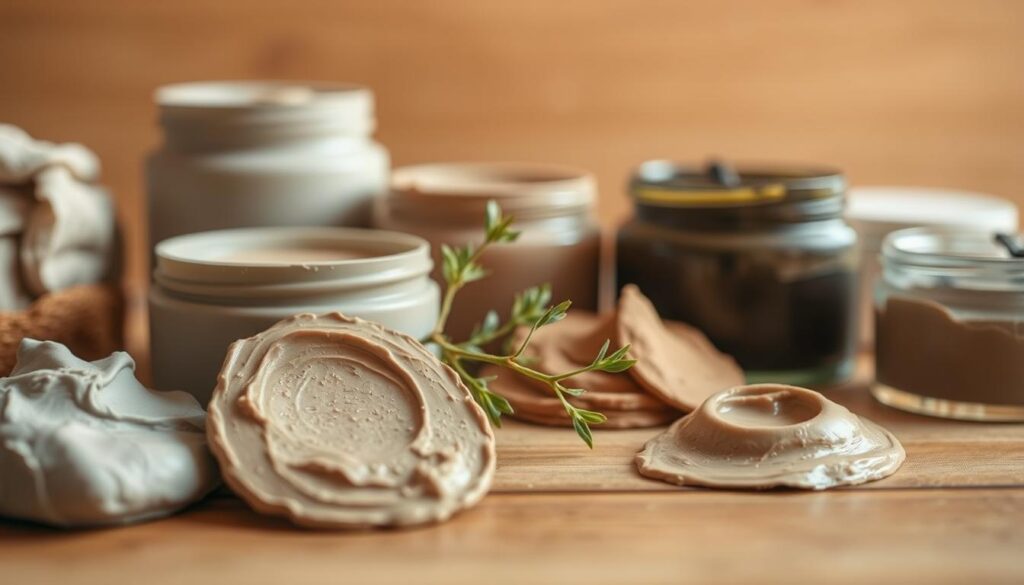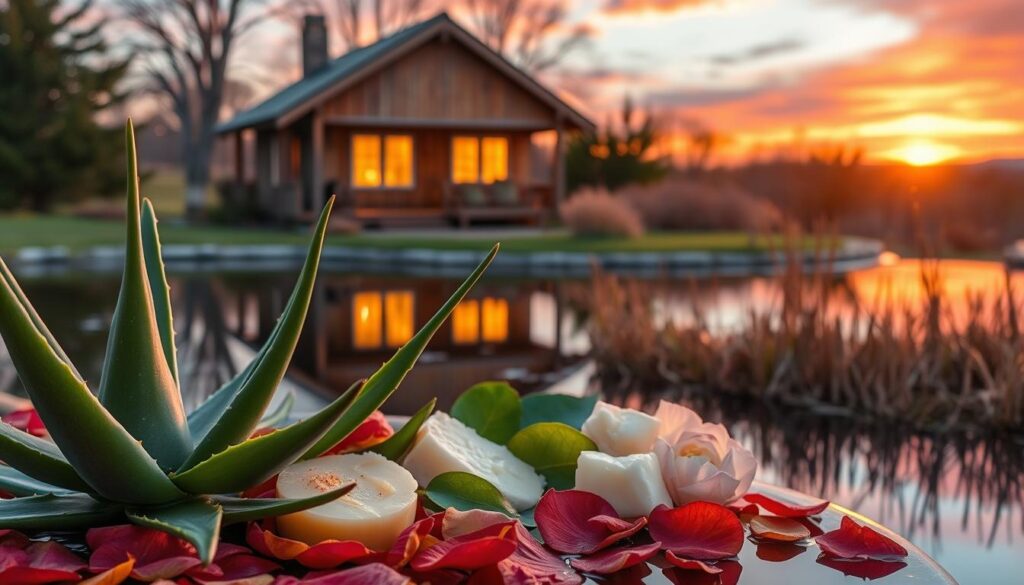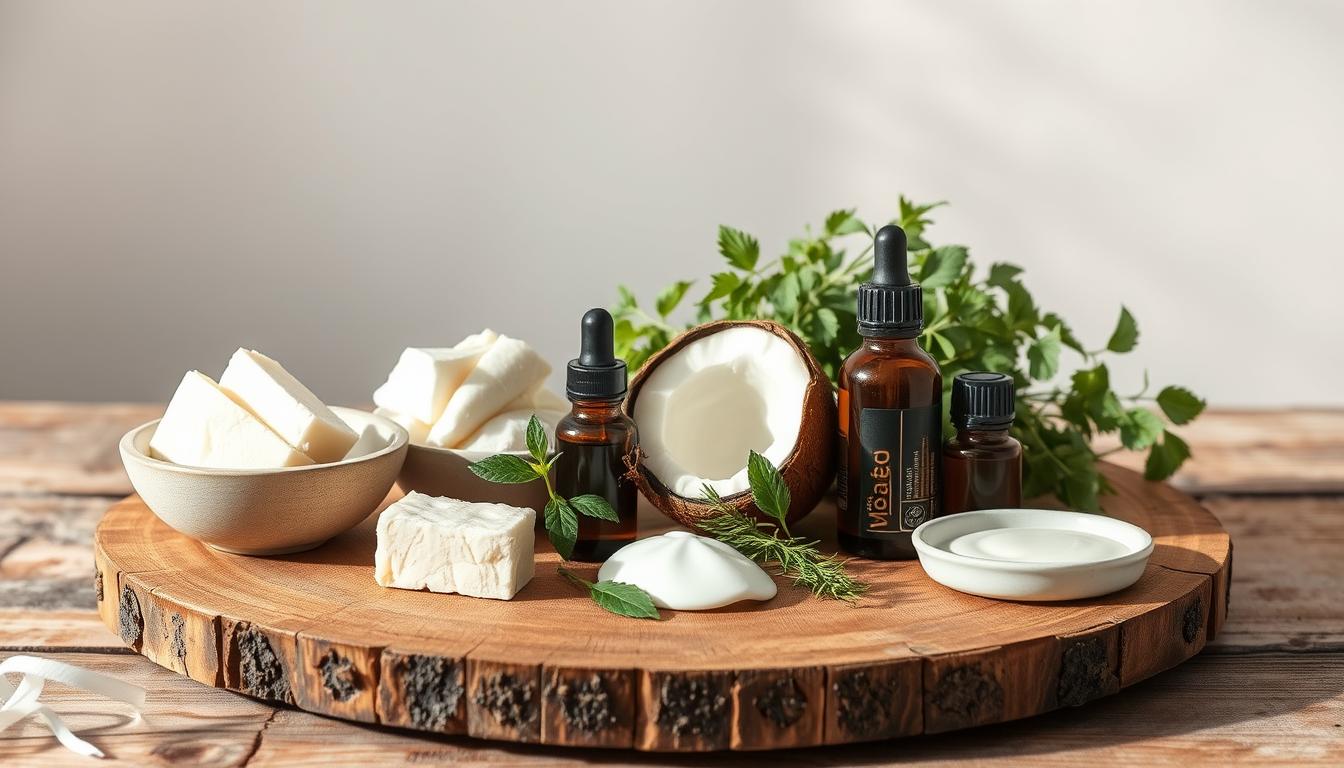Did you know drinking lots of water is key for healthy, hydrated skin? Not drinking enough can make your skin dry and tight. It can even make acne and eczema worse. Making your own moisturizers at home with natural ingredients is now easier than ever.
Knowing your skin type and picking the right products is vital for healthy skin. A good lifestyle and skincare routine can make your skin glow. In this article, we’ll show you the top DIY moisturizers and how to keep your skin hydrated naturally.
Key Takeaways
- Drinking plenty of water is essential for maintaining healthy skin.
- Understanding your skin type is key for choosing the right products.
- DIY moisturizers can be made at home using natural ingredients.
- A healthy lifestyle and the right skincare routine can lead to hydrated skin.
- Using the right products can fight dry skin and related issues.
Understanding Skin Hydration
To get healthy, glowing skin, knowing about skin hydration is key. Your skin’s hydration level affects its health and look.
What Makes Skin Dry?
Dry skin comes from many things like harsh weather, wrong skincare, and health issues. Cold or dry air makes your skin lose moisture, causing dryness and irritation.
Common causes of dry skin include:
- Using harsh skincare products that strip the skin of its natural oils
- Exposure to cold or dry air
- Underlying health conditions, such as eczema or psoriasis
Importance of Hydration
Hydration keeps your skin healthy and supple. When your skin is hydrated, it looks brighter and younger. It also makes your skin more elastic, reducing wrinkles.
Shea butter and coconut oil are excellent natural moisturizers for your skin. Shea butter is full of vitamins and minerals. Coconut oil is rich in antioxidants.
| Moisturizer | Benefits |
|---|---|
| Shea Butter | Rich in vitamins and minerals, hydrates and nourishes the skin |
| Coconut Oil | Packed with antioxidants, moisturizes and protects the skin |
Signs of Dehydrated Skin
Knowing the signs of dehydrated skin is important. If you see dryness, tightness, irritation, or dullness, your skin needs more hydration.
- Dryness or tightness
- Irritation or redness
- Dull or lackluster complexion
Adding natural hydration remedies to your skincare routine can help. It makes your skin look healthy and radiant.
Benefits of Natural Moisturizers
Natural moisturizers are great for your skin. They avoid harsh chemicals and artificial smells found in many products.
Gentle on Sensitive Skin
Natural moisturizers are gentle on sensitive skin. Aloe vera and honey soothe the skin well. They’re perfect for skin that easily gets irritated.
Eco-Friendly Options
Natural moisturizers are good for your skin and the planet. They’re made from sustainable, biodegradable ingredients. Using coconut oil or olive oil is better for the environment than synthetic ingredients.
- Reduces packaging waste
- Supports sustainable farming practices
- Biodegradable ingredients
Avoiding Harmful Chemicals
Commercial moisturizers often have harmful chemicals like parabens and sulfates. These can harm your skin over time. Making your own homemade skin moisturizers lets you choose safe ingredients.
Some harmful chemicals to avoid include:
- Parabens
- Sulfates
- Artificial fragrances
Using natural moisturizers can lead to healthy skin tips for the long term.
Essential Ingredients for DIY Moisturizers
DIY moisturizers can be very effective with the right ingredients. It’s key to know the main components that hydrate and nourish your skin.
Oils for Hydration
Oils are vital in DIY moisturizers for hydration and nourishment. Coconut oil and olive oil are top picks for their hydrating benefits.
- Coconut oil has fatty acids that lock in moisture and soothe dry skin.
- Olive oil is full of antioxidants and vitamin E, which promote healthy skin and reduce fine lines.
Adding these oils to your DIY moisturizers can make your skin soft and supple.
Natural Butters
Natural butters like shea butter and cocoa butter are great for moisturizing. They are full of vitamins and minerals that hydrate and protect the skin.
“Shea butter is a natural emollient that soothes and moisturizes dry skin, while cocoa butter provides intense hydration and helps to improve skin elasticity.”
| Natural Butter | Benefits |
|---|---|
| Shea Butter | Soothes and moisturizes dry skin, rich in vitamins A and E |
| Cocoa Butter | Provides intense hydration, improves skin elasticity |
Aloe Vera Benefits
Aloe vera is a key ingredient in DIY moisturizers, with many benefits for the skin. It’s great for soothing and calming sensitive skin.
Aloe vera gel reduces inflammation, aids in wound healing, and hydrates for a long time. Adding aloe vera to your DIY moisturizer recipes can make them more effective and beneficial for your skin.
By mixing these essential ingredients, you can make DIY moisturizers that meet your skin’s needs.
Simple DIY Moisturizer Recipes
You can make effective DIY moisturizers with just a few ingredients. Use natural items like coconut oil, honey, and shea butter. This way, you can make moisturizers that fit your skin type and needs.
Coconut Oil and Honey Blend
Mixing coconut oil with honey makes a nourishing moisturizer. Coconut oil hydrates and protects your skin. Honey keeps moisture in. To make it, mix equal parts coconut oil and honey until smooth. Apply it after washing your face for hydration.
Avocado and Olive Oil Cream
Avocado and olive oil are full of antioxidants and healthy fats. They’re great for a moisturizer. Mash an avocado and mix it with olive oil. Add a few drops of your favorite essential oil for scent. This cream is good for dry or mature skin, providing deep hydration.
Shea Butter and Essential Oils Mix
Shea butter is known for its moisturizing properties. Adding essential oils makes it luxurious and effective. Melt shea butter in a double boiler, then add your favorite essential oils. Pour into a container and cool before use. It’s good for all skin types and can be changed with different essential oils.
These DIY moisturizer recipes are effective and avoid harsh chemicals. Choosing natural ingredients is gentle and sustainable for your skin.
- Benefits of DIY Moisturizers:
- Customizable to your skin type
- Free from harsh chemicals
- Cost-effective
- Environmentally friendly
Using Aloe Vera for Skin Hydration
Aloe vera is a top pick for natural hydration. Its gel is packed with vitamins A, C, and E, and minerals like calcium and potassium. This makes it great for hydrating and soothing dry skin.
Preparing Fresh Aloe Vera Gel
To use aloe vera, you can make fresh gel at home. Just cut an aloe vera leaf, scoop out the gel, and blend it until smooth. Store it in the fridge for up to a week. Applying this gel to your skin gives it instant hydration and relief from dryness.
Aloe Vera and Its Soothing Properties
Aloe vera not only hydrates but also soothes irritated skin. It’s perfect for sunburns, minor cuts, and scrapes. Adding aloe vera to your skincare routine keeps your skin hydrated, calm, and protected.
Regular use of aloe vera improves skin elasticity and reduces fine lines. It’s a natural way to keep your skin healthy and hydrated.
Hydrating Facial Masks to Try
Hydrating facial masks are a great way to give your skin a moisture boost. You can make masks with natural ingredients for different skin types and needs.
Nourishing Oatmeal and Yogurt Mask
Oatmeal and yogurt make a soothing mask for irritated skin. Oatmeal reduces redness and inflammation. Yogurt gently exfoliates, making your skin smooth and refreshed.
Banana and Honey Hydrating Mask
A banana and honey mask is perfect for dry skin. Bananas are full of vitamins and minerals that nourish your skin. Honey locks in moisture, keeping your skin hydrated for longer.
Green Tea Infused Moisturizer
Green tea is great for hydrating masks because of its antioxidants. Adding green tea to a moisturizer protects your skin from harm while keeping it hydrated.
For more hydrating face mask ideas, check out Earthraga’s blog on hydrating face masks for a natural glow.

| Mask Type | Key Ingredients | Benefits |
|---|---|---|
| Oatmeal and Yogurt | Oatmeal, Yogurt | Soothes and exfoliates |
| Banana and Honey | Banana, Honey | Hydrates and nourishes |
| Green Tea Infused | Green Tea | Antioxidant and hydrating |
Importance of Hydration in Your Routine
To get healthy, hydrated skin, knowing how to hydrate is key. Hydration is vital in any skincare routine. It keeps your skin healthy and looking good.
Drinking lots of water and using hydrating ingredients for skin are musts. A regular routine strengthens your skin’s natural barrier. This makes it better at fighting off environmental harm.
Morning vs. Evening Hydration
When you hydrate matters a lot. In the morning, it helps replace moisture lost overnight. It also gets your skin ready for the day.
At night, hydration helps fix and refresh your skin. The skin repairs itself more at night. Using hydrating products before bed makes it softer and more supple in the morning.
Layering Hydration Products
Layering hydration products makes your routine better. Start with a hydrating toner or essence. Then, use a serum or treatment product for your skin issues. Finish with a moisturizer that fits your skin type.
When layering, apply products in the right order. Let each one soak in before adding the next. This way, your skin gets the most from each product, leading to better hydration and health.
Adding these steps to your daily skincare routine helps keep your skin hydrated and healthy. Remember, being consistent and listening to your skin’s needs is important. This way, you can find the best routine for you.
Seasonal Changes and Skin Hydration
Seasonal changes can really affect your skin’s moisture levels. It’s key to change your skincare routine as the seasons shift. Your skin’s needs change with the weather.
Adjusting Your Moisturizer in Winter
In winter, the cold and dry air can dry out your skin. You’ll need a thicker, more emollient moisturizer to protect it. This type of moisturizer acts as a shield against the harsh weather.
Look for moisturizers with:
- Shea butter for deep hydration
- Honey for its antibacterial and moisturizing effects
- Coconut oil to keep moisture in
| Ingredient | Benefits |
|---|---|
| Shea Butter | Intensely hydrates and protects the skin |
| Honey | Natural antibacterial properties and moisturizer |
| Coconut Oil | Locks in moisture and nourishes the skin |
Summer Hydration Tips
In summer, you want to keep your skin hydrated without clogging pores. A lighter, oil-free moisturizer is best. It provides moisture without making your skin feel heavy.
Choose products with:
- Aloe vera for hydration and soothing
- Green tea for antioxidants
- Light oils like jojoba or grapeseed

Changing your moisturizer with the seasons helps keep your skin healthy and hydrated all year. Remember, your skin’s needs change with the weather. Listen to your skin and adjust your skincare routine as needed.
Common Mistakes to Avoid in Hydration
Getting healthy, hydrated skin is more than just the right products. It’s also about avoiding common mistakes. Knowing what not to do is as key as knowing what to do.
Overdoing Moisturizers
Too much moisturizer can clog pores and stop your skin from breathing. This can cause more problems than it solves. It’s important to find the right amount and use it in moderation. Start with a small amount and adjust as needed.
Ignoring Sunscreen
One big mistake is ignoring sunscreen. UV rays can damage your skin, making it dry and age faster. Always apply a broad-spectrum sunscreen with at least SPF 30 daily, even on cloudy days.
Relying Solely on Hydration Products
Just using hydration products without a full skincare routine can mess up your skin. It’s important to layer your products correctly and think about exfoliation and toning.
| Common Hydration Mistake | Consequence | Correction |
|---|---|---|
| Overdoing Moisturizers | Clogged pores, skin irritation | Use in moderation |
| Ignoring Sunscreen | Premature aging, dryness | Apply SPF 30 daily |
| Relying Solely on Hydration Products | Imbalanced skin | Layer products correctly, consider full skincare routine |
By knowing these common mistakes and avoiding them, you can get healthier, more hydrated skin. The secret to good skin hydration is balance and consistency.
Final Thoughts on Natural Skin Hydration
Now you know how to keep your skin hydrated naturally with DIY moisturizers. It’s time to start using these tips. Creating a routine that works for you is key to healthy, moist skin. By knowing what your skin needs and adjusting your routine, you can get the glowing skin you dream of.
Creating a Personalized Routine
Try out different DIY skincare recipes to find what’s best for you. Mix ingredients like coconut oil, aloe vera, and shea butter to make a moisturizer that fits your skin type.
Listening to Your Skin
Watch how your skin reacts to different products and change your routine if needed. This way, you can choose the best natural hydration methods for your skin.
Follow these tips and stay committed to your skin’s health. You’ll soon have hydrated, radiant skin that looks healthy. Begin your natural hydration journey today and see the benefits of How to Hydrate Your Skin Naturally.
FAQ
What are the best natural ingredients for hydrating the skin?
The top natural ingredients for hydrating skin are coconut oil, shea butter, and aloe vera. Honey and olive oil are also great. They moisturize and nourish the skin well.
How do I determine my skin type?
To find out your skin type, watch how it acts all day. If it’s oily, dry, or a mix, adjust your skincare. A dermatologist can also help figure it out.
Can I use DIY moisturizers on sensitive skin?
Yes, you can use DIY moisturizers on sensitive skin. Just pick gentle, non-irritating ingredients. Stay away from harsh chemicals and fragrances.
How often should I hydrate my skin?
Hydrate your skin twice a day, morning and night. This keeps it healthy and moist. Use a hydrating mask once or twice a week for extra moisture.
What are some common mistakes to avoid in hydration?
Avoid using too much moisturizer, forgetting sunscreen, and only using hydration products. Balance your skincare with a mix of products for healthy, moist skin.
How can I adjust my moisturizer according to the season?
In winter, use a thick moisturizer to keep moisture in. In summer, choose a light, oil-free one to avoid clogged pores. Use a humidifier in dry places to keep air moist.
Can I use aloe vera gel straight from the plant?
Yes, you can use aloe vera gel from the plant. Just clean and prepare it well to avoid contamination. Storing it in the fridge can also extend its life.
How do I layer hydration products effectively?
Start with a light product like a toner or serum. Then apply a moisturizer or cream to keep moisture in. Adding a facial oil or cream can give extra hydration and protection.

